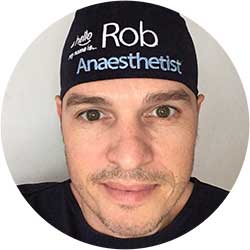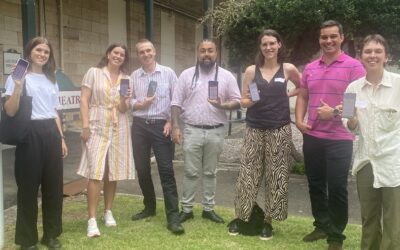– Co-written by Dr Anni Mikhail & Dr Rob Hackett.
This year MedApps is supporting a PatientSafe Network initiative – The Theatre Cap Challenge by providing personalised, reusable theatre caps to interns at participating facilities across NSW and QLD.
The realities of modern healthcare are that rigidly assigned theatre teams are a rarity. Generally speaking, humans are very poor at remembering names. Even when not distracted we only remember 30% after first introduction and then readily forget them. While name and role introductions as part of the ‘team time out’ (in theatres suites that conduct them) are very important and have been shown to improve the propensity for staff to speak up they have little impact on name recall.
At present surgeons only know 44% of the names of their staff in operating theatres.
Name and role caps increase name recall, improve communication, team work, camaraderie and the propensity for staff to speak up. Use of staff names has been shown to improve patient outcomes. Communication carried out using nominal closed loop methods is completed 3.6 times faster than indirect communication.
Surveys indicate the name & role cap initiative is supported by 92% of patients and 88% of front line staff. Several hospitals internationally are now benefitting from the adoption of name and role theatre caps as standard.
Why are personalised theatre caps important?
Perhaps the greatest benefits to patient care with adopting reusable caps come through the implications on improved communication. Within operating theatres personalised reusable caps represent the best and simplest method for ensuring adequate staff identification in accordance with the Garling Inquiry and subsequent NSW Health policies from 2008:
‘Require the wearing of name badges or similar (but not cards on lanyards) by each type of health professional, bearing in large print the person’s name and title or role’
From an environmental perspective the implications are also great. Disposable caps are made from viscose – a substance whose manufacture is harmful to the environment.
ANZCA Statement on Environmental Sustainability in Anaesthesia PS64 (2018):
‘Use of freshly laundered lint free hats will reduce the number of caps which are discarded and add to waste.’
Financially it stacks up as well a 20 theatre hospital will discard approximately 100,000 disposable theatre hats every year. From a financial perspective a move to reusable theatre caps represents a cost saving of between AU$5000 and AU$20,000 year on year.
But doesn’t this increase infection rates?
In June 2019 the AORN – the leading body in Perioperative Standards worldwide – upgraded their recommendation on theatre caps to state:
‘The evidence does not demonstrate any association between surgical site infection rates and the type of surgical head covering material or extent of hair coverage. No recommendation can be made for the type of head covering worn in the semi-restricted and restricted areas.’
This movement is gaining momentum internationally and we’re excited to play a small part in the promotion of an initiative that improves clinician communication and patient care.
For further reading on this initiative or to get involved reach out to Dr Rob Hackett Senior Consultant Anaesthetist & Director of the PatientSafe Network or one of the Med App team.
Join the Theatre Cap Challenge.

By Dr Rob Hackett
Rob is a Senior Anaesthetist Consultant with the PatientSafe Network – together we’ll create the best environment for patient care – psnetwork.org. You can find Dr Rob on Linkedin.





0 Comments